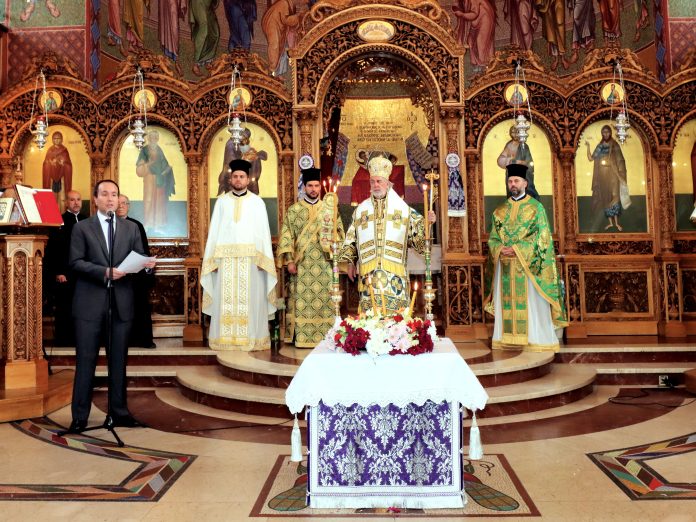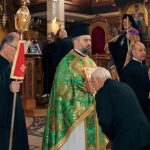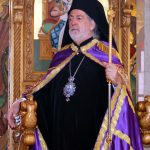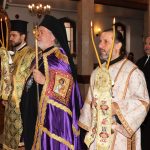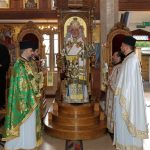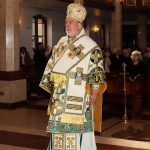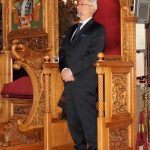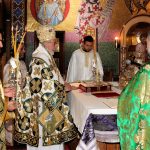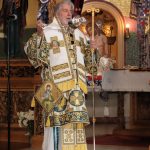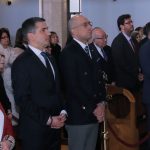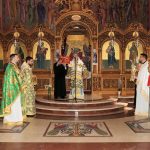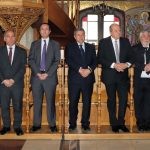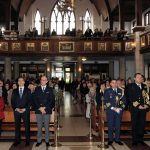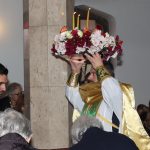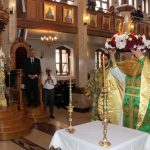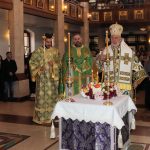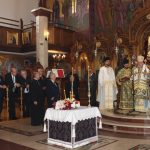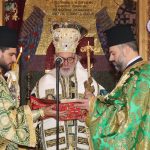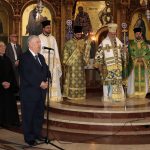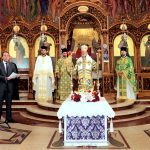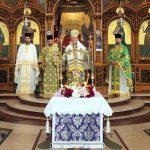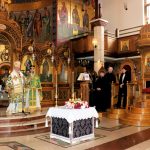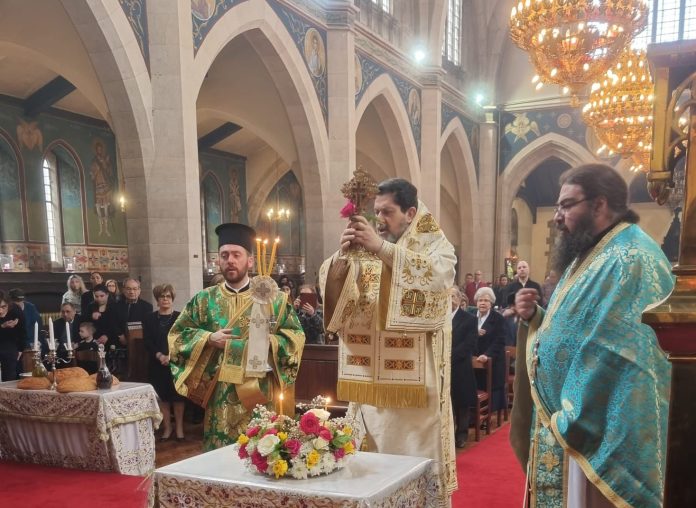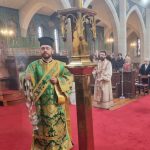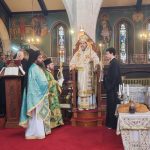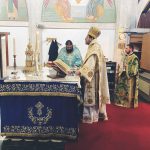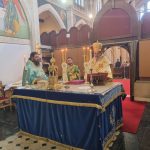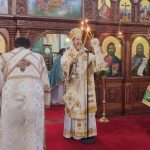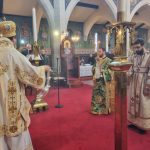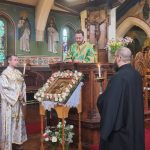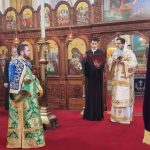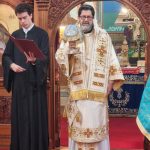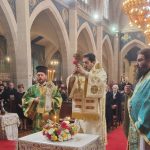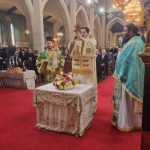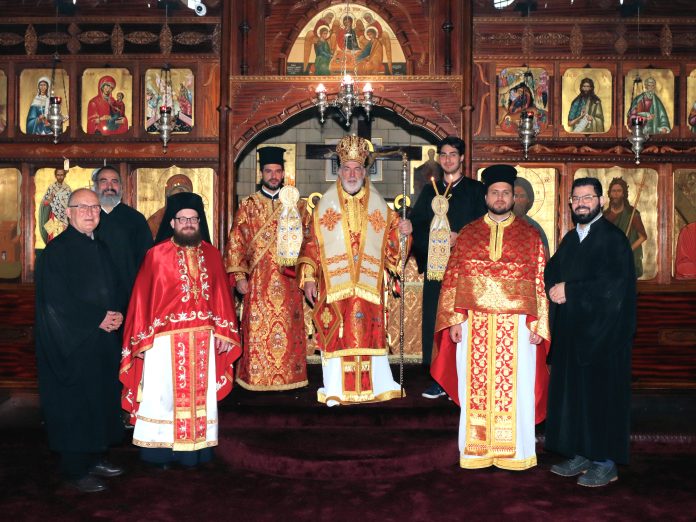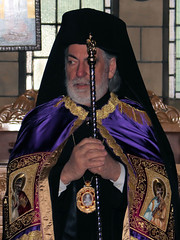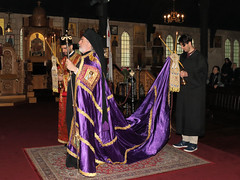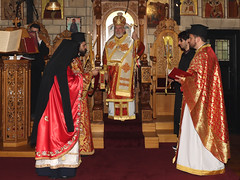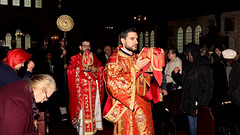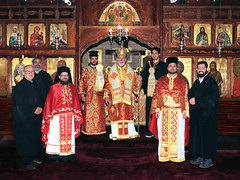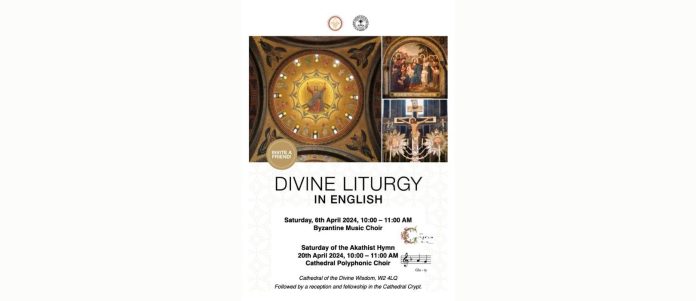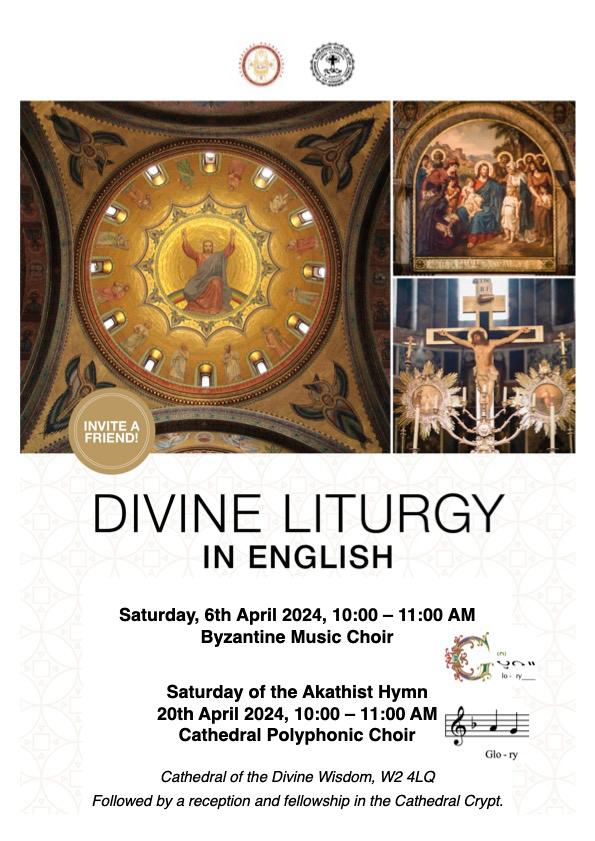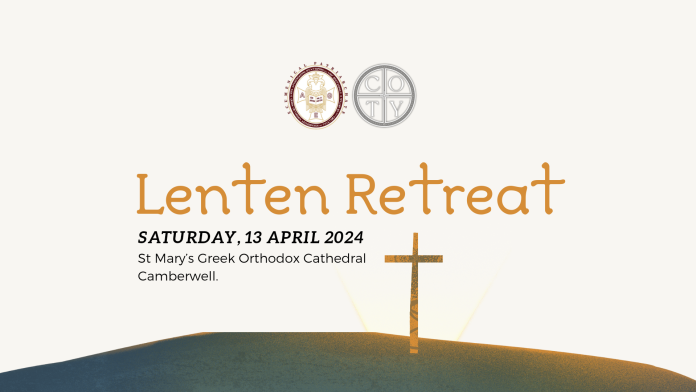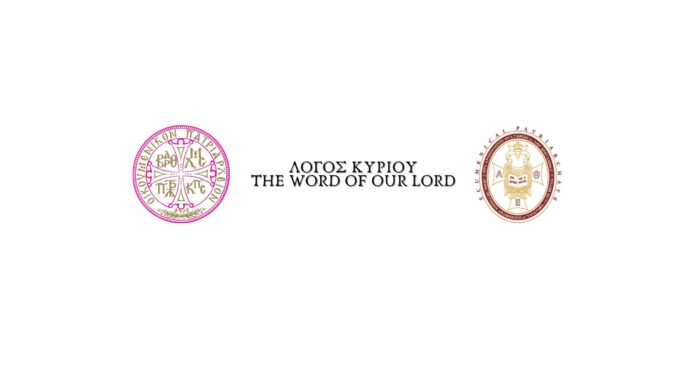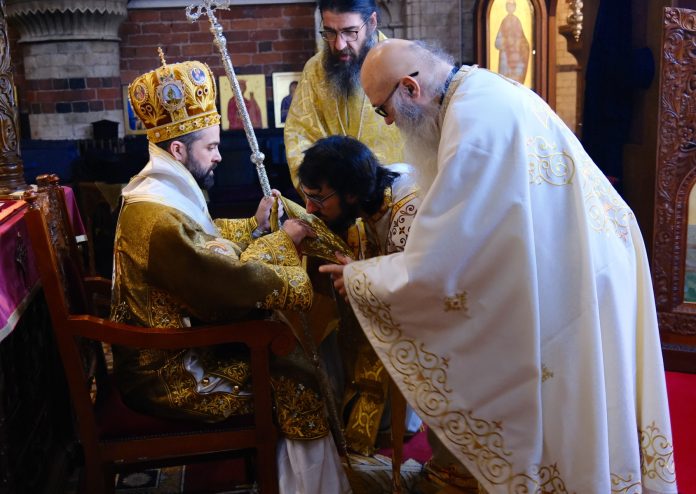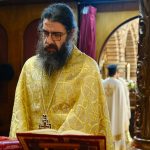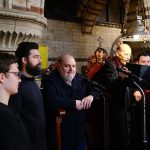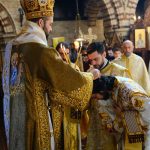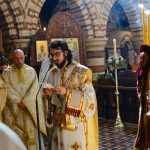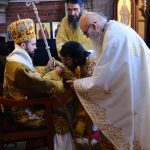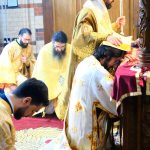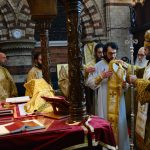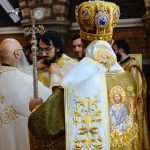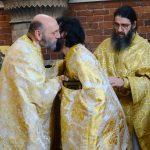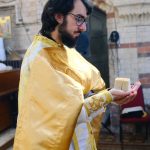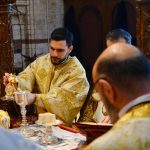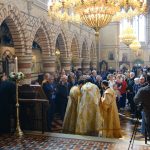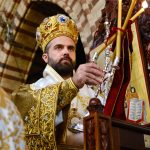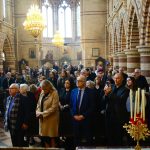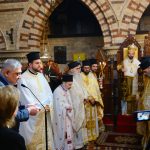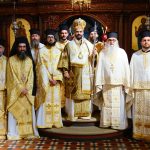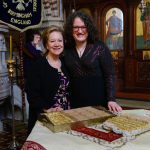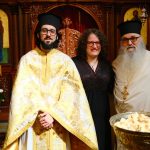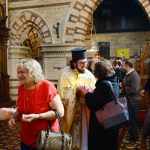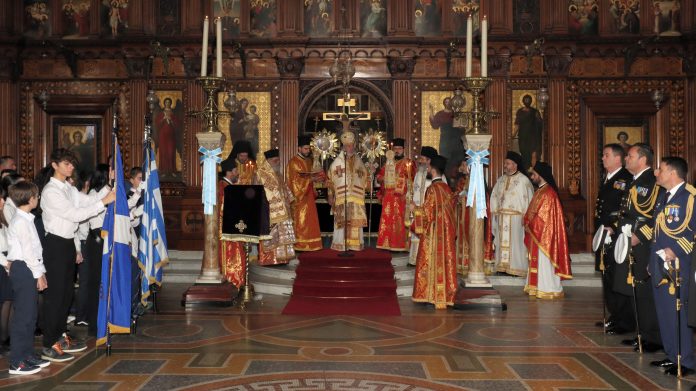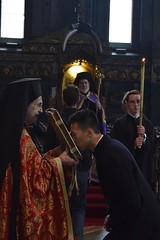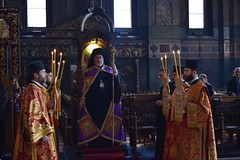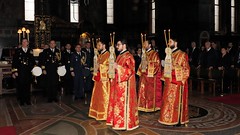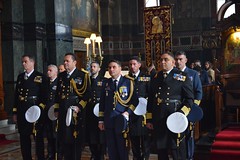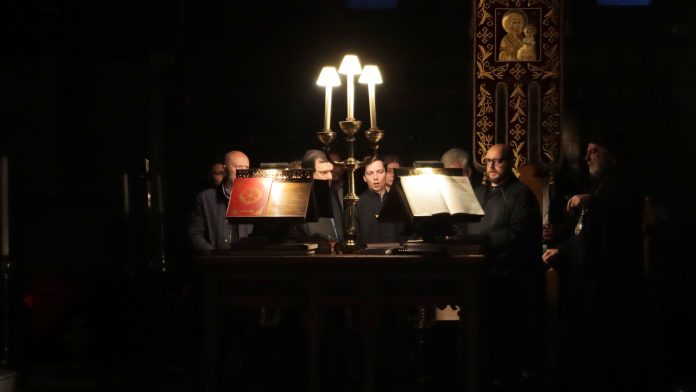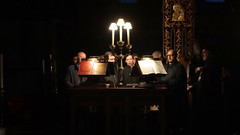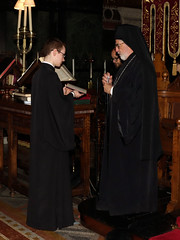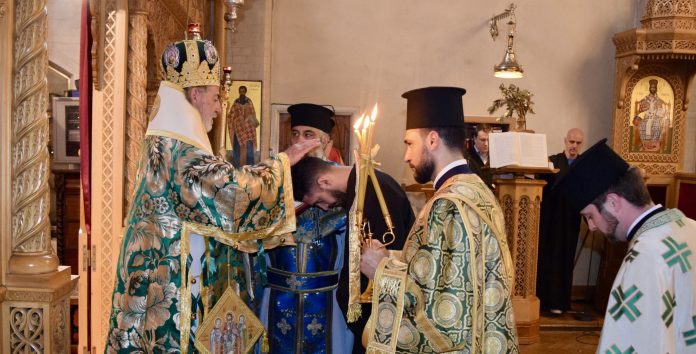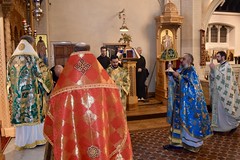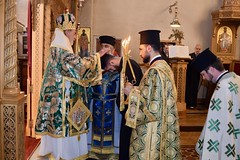On the evening of Sunday, 17th March 2024, at the Holy Archdiocesan Cathedral of the Divine Wisdom in Bayswater, His Eminence Archbishop Nikitas presided over the Vespers of Forgiveness, marking the commencement of Holy and Great Lent. Joining His Eminence in prayer were His Eminence Metropolitan Athanasios of Colognia and His Grace Bishop Iakovos of Claudiopolis, along with the Very Revd Archimandrite Nephon Tsimalis, Protosyncellus of the Archdiocese. Numerous clergymen from the greater London area also attended, as is customary for the start of Great Lent.
After vespers, His Eminence Archbishop Nikitas expressed his wishes for a blessed and fruitful Lenten season to all those present and invited the Revd Protopresbyter John Hookway to deliver a homily on the significance of forgiveness in the lives of Orthodox Christians.
Sermon at Vespers of forgiveness
St Sofia, 17/03/24
Fr John Hookway
As we are gathered by the Church, within this Cathedral to begin together as church, with the blessing of our Archbishop, our entry into Lent and procession through repentance towards Pascha, we commemorate, with the casting out of Adam from Paradise, the feast of St Cyril Archbishop of Jerusalem born in 315, who gave lectures of instruction, delivered during the Great Fast, to prepare catechumens for their baptism at Easter, their Passover from darkness to light. In the Prologue to his catechesis St Cyril’s words speak to our gathering this evening : “Thou art come within the Church’s nets: be taken alive, flee not: for Jesus is angling for thee, not in order to kill, but by killing to make alive: for thou must die and rise again. For thou hast heard the Apostle say, Dead indeed unto sin, but living unto righteousness. Die to thy sins, and live to righteousness, live from this very day.”
As the altar coverings and clergy vestments change into the penitential, sombre colours of Lent and we stop eating hearty food, we are called to “set out with joy upon the season of the Fast” (Stichera from Triodion at Vespers of Forgiveness). In remembering our forefather Adam’s exile from Paradise there is lamenting and weeping as we sing with the hymnographer, “I alone have become a slave to sin; I alone have opened the door to the passions”, but, in the same breath, we appeal to “the Word who [is] ready to forgive” saying, “in thy tender mercy turn me back and save me” (Mattins Clean Monday, Canticle 1). St Cyril also turns his candidates for baptism towards hope saying, “He who shed His precious blood for us, shall Himself deliver us from sin. Let us not despair of ourselves, brethren; let us not abandon ourselves to a hopeless condition. For it is a fearful thing not to believe in a hope of repentance” (Lecture 2 para.5).
We readily turn back to the Lord, who is angling for our soul, recognising our sins with sorrow but believing in a hope that our descent into repentance is at the same time an ascent into new life. “Live from this very day”, St Cyril commands. We sit with Adam outside the gates of Paradise and join our voice to his and say, “Woe is me,…I transgressed one commandment of the Master, and now I am deprived of every blessing…” and we are comforted hearing the voice of the Lord, as the hymn continues, “Then the Saviour said to him: ‘I desire not the loss of the creature which I fashioned… and when he comes to me I will not cast him out.” (Saturday Vespers of Sunday of Forgiveness: Glory of the Aposticha)
As we recognise that we are fallen, dead as driftwood and deserving to be cast out of the nets, the good Lord of mercies does not reject us but receives us into his quickening presence.
This season of repentance is Great Lent, because of the hope which it offers, if we apprehend and behold it as, “the appointed time…the day of salvation” (Clean Monday Mattins canticle 1) in which great things can happen. Not least of these is that our sins can be wiped clean, if we enter in, and, as a verse in tomorrow’s mattins, instructs, we are “watchful, close all the doors through which the passions enter, and look up towards the Lord” (Clean Monday Mattins canticle 1). Unless we look up towards the Lord, we cannot uproot the passions. Only when we behold the “beauty and loving-kindness of Christ, “the immaculate and spotless Lamb… and His indescribable humility”, Archim. Zacharias explains, and only when we hold the vision of the Lord against that of the “inner ugliness”… “of the hideous mask” which now covers our ancient beauty and only when we grow “strong in this two-fold vision”, can a man “uproot the passions from his heart”. This is because the vision crushes a person’s heart, reveals its unrighteousness and allows us in humility, called the blessed short-cut to dispassion by St John of the Ladder (Step 25 para. 35), to “follow in the footsteps of the Lord on the path of descent” (At the Doors of Holy Lent p. 127-128). The Church is there for us as a strong support, describing, revealing and projecting this two-fold vision to us, in its hymns, readings and prayers, to help us to find a place of repentance, a broken and contrite heart, the ground in which the virtues can be born.
At the Liturgy this morning we heard the Apostle say to us on this last day before Lent, “the night is far gone, the day is at hand.” and that we are to “cast off the works of darkness and put on the armour of light” (Rom.13,12). At Lent’s beginning, we look up towards the end, the day of the Resurrection from where the bridegroom is calling us into the stadium, so that we will be able to meet Him having been watchful, having longed for His coming through a repentance that has prepared and enlivened our hearts by “the sensation of the presence of God” (At the Doors… Archim. Zacharias p235).
At the Sunday of the Last Judgement, an event which will take place at the end of time is brought before us to help us to use the present to pre-empt God’s judgement by judging ourselves. God’s judgement is upon us in that He has purchased us with his precious blood through the Cross, but do we choose to live for Him and to labour to be born into new life, following Him who is the Way of humility and love? Only when we keep in front of the eyes of our soul our presentation before the Lord on the fearful day of His second coming in glory with all the angels, can we live our lives as a single presentation before the Lord who says by His prophet Jeremiah, “I the Lord search the heart, I try the reins, even to give every man according to his ways, and according to the fruit of his doings” (17,10). The five foolish virgins delayed, deciding only at the last moment to prepare their lamps, and were shut out of the Bridechamber. Keeping the vision of the Resurrected Christ who will come as judge before us, we hasten through the narrow gate of repentance. All time is made precious by the vision, every night and day an invitation to die and live with Christ, every hour an opportunity for salvation and every encounter with another human the means of our entrance into life eternal.
We may think of Lent as a time for introspection and prayer, dedicated to our personal struggle to repent and fast without much reference to others. Our fasting and struggle is not undertaken however, in isolation. A fundamental feature of spiritual house-keeping is our reference to a spiritual father, to whom we must confess our sins and through whom we are reconciled to the body of believers, the church, as there is no one who can save themselves. Adam fell and all of humanity suffers the consequences and we are saved together, as church, as the family of believers. Our brother or sister is not the problem, the other not a hindrance and threat to the spirituality of our fast. Our brother is our life. Our very admittance into the presence of the Bridegroom depends on practical acts of love towards the least of our brothers and sisters, because in such works of love are the fulfilling of the commandment to love God and neighbour. Such acts of love are the fruits of our repentance and the token of its genuine character. Repentance has been described as the state of being in loving communion with God and our neighbour. As bodily virginity alone did not open the door to the five foolish virgins, so we remember today that Lent is not primarily about what we give up, cast off and do not do, but about what we take up and do. It is not enough to refrain from evil but we must become the doers of good. Avoidance of sin, without works of selfless love, will not justify us. So we not only to turn inwards as Lent begins, to repent, but we turn outwards to the other to show our repentance in action as “every act of love towards our fellow man is an investment in eternal life” (Archim. Zacharias, At the doors…p. 80). As we give our things, our time, effort or attention to others, our hearts learn to become detached from what we give and become invested in the persons to whom we turn and for whom Christ died. As we transfer our treasures to others, our hearts follow them there and become free. True repentance changes our perception of others and of our things. In a nutshell our askisis in Lent is to do acts of love. This is our spiritual struggle. To learn to do things with love, to give alms, to give of ourselves, to forgive, to pray with love, but knowing we are cursed if we think we are righteous.
Our fasting from rich foods has love and freedom as its purpose. Adam’s exile from Paradise was the result of his choice to obey to his self-centred desires which severed communion with God. Neither is love for another person possible if we are enslaved to self-centred desires and passions. If Paradise was lost through the instant gratification of self-serving desire and the refusal to fast, when we fast from what is appealing to us to eat, through obedience to the Church, our passion-driven will can be healed and we are helped to turn our hearts to God and neighbour. Only through love can a person become one with his fellow and with God whereas self-love cuts him off from both. The exterior action of fasting helps turn our interior disposition towards God and neighbour and that is why fasting is always to be accompanied in the tradition of the Church by prayer and almsgiving.
The fast is a call to freedom to serve God and our fellow and gain access to eternal life. It is a season of intensive care of the soul, a school of kindness and cultivation of Christ-like love. It is a training ground where practice makes perfect in the sense that even if we don’t feel like it, we practice kindness, love, mercy, giving and forgiveness, and God, who sees our effort, adds to us His grace to transform our stony hearts into hearts of flesh making them kind, loving, merciful, generous and forgiving. If we want to learn to repent, we practice repentance, that is we practice loving our neighbour, and God will change our hearts and give us the gift of repentance and of love.
We enter Great Lent through the present Vespers of Forgiveness. It has been said that, “forgiveness is the way in which fallen human beings express their love for one another” (Fr Thomas Hopko). If we are to be God’s children we must practice forgiveness to become one heart with the Father of forgiveness. Forgiving others frees us from darkness of the prison of self-love. It is a key aspect of our effort to repent and turn our whole heart to God because God wants our whole heart. We can’t be half-hearted Christians and so must “beware”, says St Cyril, “lest [we] have the title of “faithful,” but the will of the faithless” (Prologue to the Catechetical Lectures para.6). If we do not forgive, we will not persuade God that we are His children and “the bearers of His Presence which is Love” (Fr Thomas Hopko, “If we confess our sins”, OCA, 1975). If we fail to forgive, we fail to repent and ultimately, we will fail to hear, “Well done good and faithful servant… enter into the joy of your Lord” (Matt. 25:23).
The fast is a spiritual reset, a reversal of the mind’s dispersal, a regrouping of our spiritual powers. As spiritual athletes we enter, at the beginning of the Great Fast, the arena of the Church, the arena of love, to contend with the enemy and be crowned with the virtues. We would have a good Lent if we come to know this season our weakness, if we achieve knowledge of our sinfulness and imperfection, if we see that all is a gift of God’s grace and that without Him we can do nothing, so that we humbly beg God to save us without a cause, freely and proclaim, “not unto us, O Lord, not unto us, but unto Thy name give glory” (Ps. 113,9). For God is not pleased with our pretence but with an honest heart which beholding the icon of the Resurrection, courageously follows the humility of the Lord to descent into hell and tastes in the soul even in the sombre days of Lent, resurrectional joy as the fruit of the grace of humility.
Leaving the final word to St Cyril of Jerusalem, may his prayers throughout the Lenten season instruct and transform our hearts to carry the Presence of Christ in order to bear the brightness of His glory at His Resurrection.
“Let us nerve our minds, and brace up our souls, and prepare our hearts. The race is for our soul: our hope is of things eternal: and God, who knoweth your hearts, and observeth who is sincere, and who a hypocrite, is able both to guard the sincere, and to give faith to the hypocrite: for even to the unbeliever, if only he give his heart, God is able to give faith. So may He blot out the handwriting that is against [us], and grant [us] forgiveness of [our]… trespasses…” (Prologue to the Catechetical Lectures para.17)

